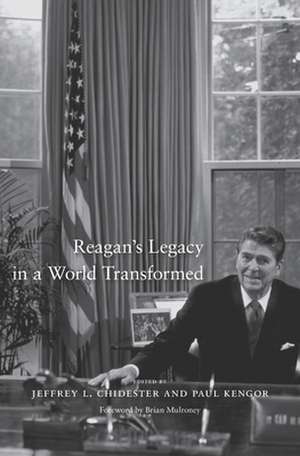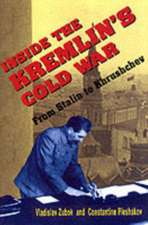Reagan`s Legacy in a World Transformed
Autor Jeffrey L. Chidester, Paul Kengor, Brian Mulroney, Barry E. Carter, Eliot A. Cohenen Limba Engleză Hardback – 16 apr 2015
The authors consider the influence of Reagan's free-market ideas on economic globalization, showing how deregulation succeeded in spurring economic expansion. In foreign policy, Reagan favored significant increases in military spending ("peace through strength") and an assertive agenda abroad. His break with d tente in dealing with the Soviet Union, notably expressed in his 1982 March of Freedom speech, effectively restored the early Cold War strategy of rolling back communism. More than twenty years later, President George W. Bush invoked this speech in describing his goals in the Middle East--a striking example of how Reagan's ideas affected the post-9/11 world.
In contrast with his hawkish stance on defense, Reagan's efforts to reduce nuclear arsenals, negotiated with Mikhail Gorbachev, constitute one of his enduring contributions to stability. Although Reagan's policies soared on rhetoric rooted in ideological conviction, the president engaged in pragmatic internationalism when a multilateral approach served America's interests. He believed that America had a special mission as a moral leader and beacon of freedom, a view that continues to inform U.S. foreign policy.
Preț: 419.65 lei
Nou
Puncte Express: 629
Preț estimativ în valută:
80.31€ • 83.54$ • 66.30£
80.31€ • 83.54$ • 66.30£
Carte tipărită la comandă
Livrare economică 15-29 aprilie
Preluare comenzi: 021 569.72.76
Specificații
ISBN-13: 9780674967694
ISBN-10: 0674967690
Pagini: 312
Dimensiuni: 169 x 241 x 29 mm
Greutate: 0.68 kg
Editura: Harvard University Press
ISBN-10: 0674967690
Pagini: 312
Dimensiuni: 169 x 241 x 29 mm
Greutate: 0.68 kg
Editura: Harvard University Press
Notă biografică
Descriere
Reagan's Legacy in a World Transformed offers a timely retrospective on the fortieth president's policies and impact on today's world, from the influence of free market ideas on economic globalization, to the role of an assertive military in U.S. foreign policy, to reduction of nuclear arsenals in the interest of stability.














